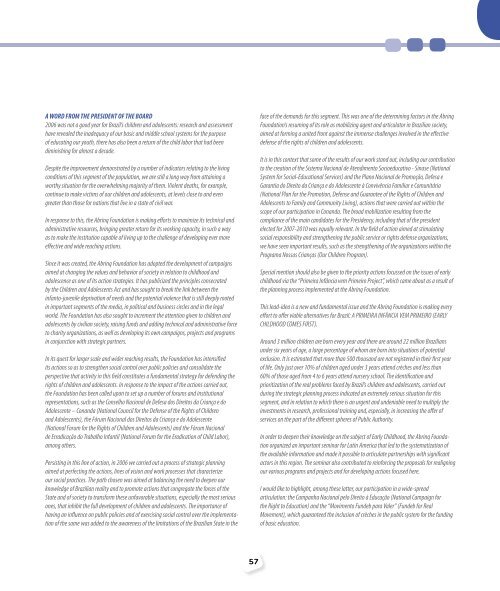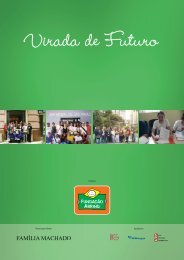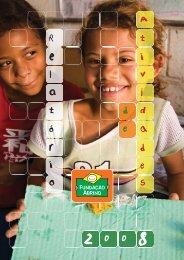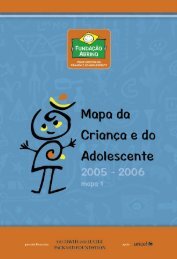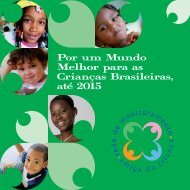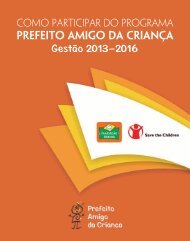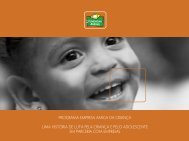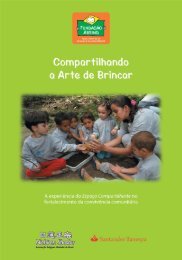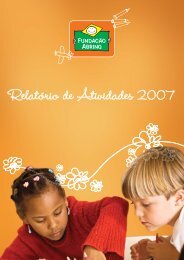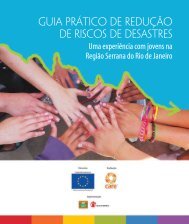You also want an ePaper? Increase the reach of your titles
YUMPU automatically turns print PDFs into web optimized ePapers that Google loves.
A WORD FROM THE PRESIDENT OF THE BOARD<strong>2006</strong> was not a good year for Brazil’s children and adolescents: research and assessmenthave revealed the inadequacy of our basic and middle school systems for the purposeof educating our youth, there has also been a return of the child labor that had beendiminishing for almost a decade.Despite the improvement demonstrated by a number of indicators relating to the livingconditions of this segment of the population, we are still a long way from attaining aworthy situation for the overwhelming majority of them. Violent deaths, for example,continue to make victims of our children and adolescents, at levels close to and evengreater than those for nations that live in a state of civil war.In response to this, the <strong>Abrinq</strong> Foundation is making efforts to maximize its technical andadministrative resources, bringing greater return for its working capacity, in such a wayas to make the institution capable of living up to the challenge of developing ever moreeffective and wide reaching actions.Since it was created, the <strong>Abrinq</strong> Foundation has adopted the development of campaignsaimed at changing the values and behavior of society in relation to childhood andadolescence as one of its action strategies. It has publicized the principles consecratedby the Children and Adolescents Act and has sought to break the link between theinfanto-juvenile deprivation of needs and the potential violence that is still deeply rootedin important segments of the media, in political and business circles and in the legalworld. The Foundation has also sought to increment the attention given to children andadolescents by civilian society, raising funds and adding technical and administrative forceto charity organizations, as well as developing its own campaigns, projects and programsin conjunction with strategic partners.In its quest for larger scale and wider reaching results, the Foundation has intensifiedits actions so as to strengthen social control over public policies and consolidate theperspective that activity in this field constitutes a fundamental strategy for defending therights of children and adolescents. In response to the impact of the actions carried out,the Foundation has been called upon to set up a number of forums and institutionalrepresentations, such as the Conselho Nacional de Defesa dos Direitos da Criança e doAdolescente – Conanda (National Council for the Defense of the Rights of Childrenand Adolescents), the Fórum Nacional dos Direitos da Criança e do Adolescente(National Forum for the Rights of Children and Adolescents) and the Fórum Nacionalde Erradicação do Trabalho Infantil (National Forum for the Eradication of Child Labor),among others.Persisting in this line of action, in <strong>2006</strong> we carried out a process of strategic planningaimed at perfecting the actions, lines of vision and work processes that characterizeour social practices. The path chosen was aimed at balancing the need to deepen ourknowledge of Brazilian reality and to promote actions that congregate the forces of theState and of society to transform these unfavorable situations, especially the most seriousones, that inhibit the full development of children and adolescents. The importance ofhaving an influence on public policies and of exercising social control over the implementationof the same was added to the awareness of the limitations of the Brazilian State in theface of the demands for this segment. This was one of the determining factors in the <strong>Abrinq</strong>Foundation’s resuming of its role as mobilizing agent and articulator in Brazilian society,aimed at forming a united front against the immense challenges involved in the effectivedefense of the rights of children and adolescents.It is in this context that some of the results of our work stand out, including our contributionto the creation of the Sistema Nacional de Atendimento Socioeducativo - Sinase (NationalSystem for Social-Educational Services) and the Plano Nacional de Promoção, Defesa eGarantia do Direito da Criança e do Adolescente à Convivência Familiar e Comunitária(National Plan for the Promotion, Defense and Guarantee of the Rights of Children andAdolescents to Family and Community Living), actions that were carried out within thescope of our participation in Conanda. The broad mobilization resulting from thecompliance of the main candidates for the Presidency, including that of the presidentelected for 2007-2010 was equally relevant. In the field of action aimed at stimulatingsocial responsibility and strengthening the public service or rights defense organizations,we have seen important results, such as the strengthening of the organizations within thePrograma Nossas Crianças (Our Children Program).Special mention should also be given to the priority actions focussed on the issues of earlychildhood via the “Primeira Infância vem Primeiro Project”, which came about as a result ofthe planning process implemented at the <strong>Abrinq</strong> Foundation.This lead-idea is a new and fundamental issue and the <strong>Abrinq</strong> Foundation is making everyeffort to offer viable alternatives for Brazil: A PRIMEI<strong>RA</strong> INFÂNCIA VEM PRIMEIRO (EARLYCHILDHOOD COMES FIRST).Around 3 million children are born every year and there are around 22 million Braziliansunder six years of age, a large percentage of whom are born into situations of potentialexclusion. It is estimated that more than 500 thousand are not registered in their first yearof life. Only just over 10% of children aged under 3 years attend crèches and less than60% of those aged from 4 to 6 years attend nursery school. The identification andprioritization of the real problems faced by Brazil’s children and adolescents, carried outduring the strategic planning process indicated an extremely serious situation for thissegment, and in relation to which there is an urgent and undeniable need to multiply theinvestments in research, professional training and, especially, in increasing the offer ofservices on the part of the different spheres of Public Authority.In order to deepen their knowledge on the subject of Early Childhood, the <strong>Abrinq</strong> Foundationorganized an important seminar for Latin America that led to the systematization ofthe available information and made it possible to articulate partnerships with significantactors in this region. The seminar also contributed to reinforcing the proposals for realigningour various programs and projects and for developing actions focused here.I would like to highlight, among these latter, our participation in a wide-spreadarticulation: the Campanha Nacional pelo Direito à Educação (National Campaign forthe Right to Education) and the “Movimento Fundeb para Valer” (Fundeb for RealMovement), which guaranteed the inclusion of crèches in the public system for the fundingof basic education.57


